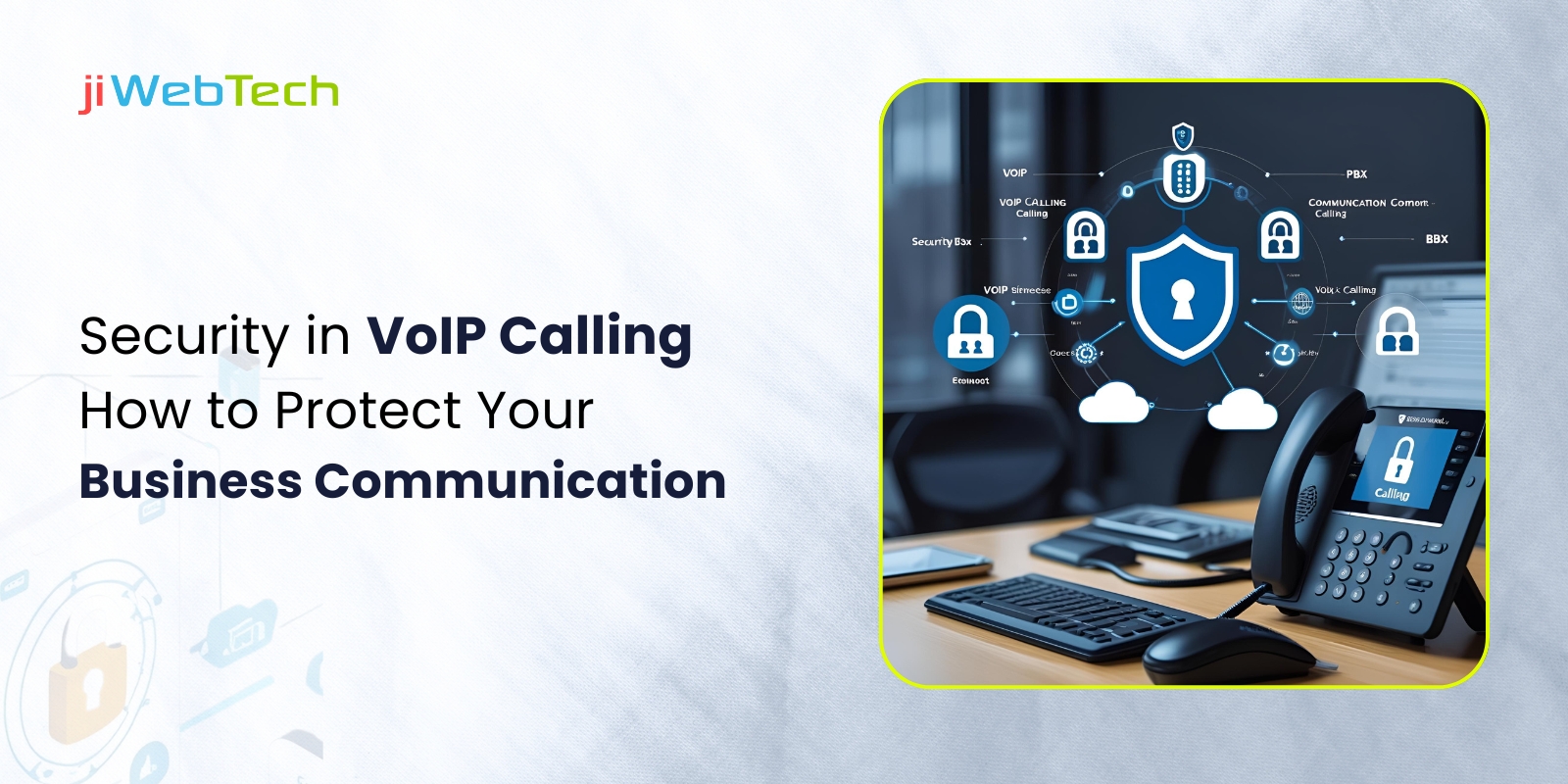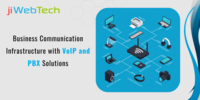- Jul 22, 2025
- Communication
- 2499
Share this post on:

According to a report, the mobile VoIP industry is estimated to reach $183.7 billion by 2027, growing at a CAGR of 21.5%. Today, we live in a digital-first era, and Voice over Internet Protocol (VoIP) has revolutionized how businesses communicate. By transmitting voice data over the Internet, VoIP calling enables businesses to save costs, scale operations, and integrate with other digital tools.
VoIP application converts your voice into digital signals, transmitting calls as packets via IP networks. This technology helps businesses save costs by making international or long-distance calls cheaper. It offers flexibility to the employees by using softphones on laptops, mobile apps, or IP desk phones anywhere with Internet. VoIP helps businesses streamline workflows by integrating with CRM, ERP, and collaboration tools.
However, deployment of VoIP technology and cloud PBX system encounters numerous challenges, including architecture complexity, interoperability issues, Quality of Service (QoS) issues, and other security concerns. Let us go deeper into the blog and learn why businesses must prioritize VoIP security and safeguard their communication channels. Whether you are a small startup or a large enterprise, safeguarding your VoIP system is important.
Key Takeaways
- VoIP enables cost-effective, scalable digital communication for businesses.
- VoIP is vulnerable to threats like eavesdropping, SIP hijacking, DDoS, and malware.
- Weak passwords, misconfigured systems, and poor encryption heighten risks.
- Best practices include encryption, strong passwords, IDS, and reliable providers.
- AI is the future of VoIP security—predicting threats and automating protection.
Security Threats in VoIP Systems
Understanding potential attack enable better defenses. Here is a detailed breakdown of key threats targeting VoIP networks.
Eavesdropping and Call Interception: VoIP converts conversations to data packets transmitted over IP networks. This makes VoIP communication solutions vulnerable to attacks. Attackers can capture these transmitted data packets using packet sniffing tools. VoIP eavesdropping can be done using cybercriminals without any physical access, and the intercepted calls can reveal sensitive customer info, trade secrets, or private HR discussions.
SIP and Registration Hijacking: Many VoIP calls use the Session Initiation Protocol (SIP) for call setup. Attackers do SIP registration hijacking by spoofing authentication messages and tricking the VoIP PBX phone system or phone into routing calls via their servers or redirecting calls to unauthorized endpoints. This allows attackers to make fraudulent calls or sniff calls.
Distributed Denial of Service Attacks: Attackers overload the cloud VoIP server or VoIP service providers with malicious traffic, and this causes phone systems to crash. SIP floods and malformed packet attacks are common. Businesses that rely completely on VoIP can suffer a total blackout during critical times.
Vishing and Social Engineering Attacks: Voice phishing is called Vishing. During these attacks, attackers make fake calls to the employees or customers, pretending to be real, and extract login credentials, financial data, or proprietary info. Customers and employees lacking awareness are easy targets, and this can be devastating.
Spam over Internet Telephony (SPIT): Spam over Internet Telephony (SPIT) bombards users with many unwanted calls or voicemail messages. This spreads malware links or wastes bandwidth. These are similar to email spam but over a voice channel.
Call Tampering and Packet Manipulation: VoIP calls can be vulnerable to attackers who interfere with the data being sent. They might catch the information, hold it back, lose it, or change its order. This can make calls sound bad, with delays, interruptions, or calls dropping. In some cases, it can even cause confusing or altered conversations.
Malware and Ransomware Injection: VoIP devices such as IP phones and PBX servers run operating systems and are vulnerable. Attackers exploit weak spots to install malware or ransomware, disabling the system, demanding ransom to restore communication.
Configuration Mismanagement: Misconfigured VoIP infrastructure, like open SIP proxies, default credentials, or exposed ports, can be used by attackers to gain unauthorized access. Many VoIP system compromises start with mismanagement rather than attacks.
Best VoIP Security Practices
Let us shed some light on the best VoIP security practices:
Selecting a Reliable VoIP Provider: The very first step to making your VoIP system secure is to choose the best business software solutions provider that truly cares about keeping things safe. Find one that uses strong encryption, includes extra protection like two-factor authentication, and regularly updates its security features. Starting with a trustworthy provider lays a strong foundation for keeping your business communication safe and sound.
Implementing Strong Password protocols: Using strong and unique passwords for your VoIP accounts is really important. Make sure to change passwords regularly and use extra security steps like multi-factor authentication. Also, encourage your team to update their passwords often and follow good security habits. This helps keep your system much safer from potential threats.
Enabling Encryption Mechanisms: Use encryption methods like Secure Real-time Transport Protocol (SRTP) to protect your VoIP calls. This makes your conversations scrambled and unreadable to anyone trying to listen in without permission. It adds an extra layer of security, keeping your calls private and safe from hackers.
Network Segmentation Strategies: Set up your network so that your VoIP calls are kept separate from other types of data. By keeping these communications apart, you lower the chances of hackers getting into your phone system. This separation helps make your overall cybersecurity much stronger and your calls safer.
Intrusion Detection Systems: Using firewalls and intrusion detection systems (IDS) helps you stay one step ahead of any suspicious activity. These tools carefully check the data coming in and out, spot anything unusual, and stop potential threats before they cause problems. They add an extra layer of protection to keep your system safe.
Future of VoIP Security
The future of VoIP security is all about layers, such as using encryption, firewalls, and smart ways to check who’s accessing your calls. As more businesses switch to cloud-based communication, keeping VoIP safe is becoming even more important. That means companies need to keep an eye on their networks all the time and be ready to jump in quickly if something suspicious happens. Technology keeps changing, and so do the risks, so staying one step ahead is the best way to protect your business. Here’s how AI and machine learning are helping:
AI-Powered Threat Detection: Imagine a super-smart security guard for your calls who can predict when someone's about to attack and then block them before they even get started. That's what AI is doing for VoIP security – stopping threats dead in their tracks.
Machine Learning for Anomaly Detection: Think of it as a super-attentive student who constantly learns how your calls normally behave. If something even slightly out of the ordinary happens, such as a weird login attempt or a strange burst of data, this "student" instantly flags it as a potential security issue.
Future-Ready Encryption & Automation: Thanks to AI, protecting your calls is becoming less of a headache. It's helping to make encryption even stronger and automating security tasks, making your VoIP system more secure and much easier to manage. It's like having security that practically takes care of itself.
Wrapping Up:
VoIP offers a lot of advantages, but businesses can not ignore the security risks that come with transmitting voice data over IP networks. A proactive and multi-layered security strategy that involves strong encryption, authentication, network segmentation, and choosing the right providers is important for safeguarding your communication infrastructure.
By investing time and resources into VoIP security, businesses can protect their confidential data and maintain customer trust. So, if you are looking for the best VoIP services provider, jiWeb Technologies is here to help. We offer the most secure VoIP online software solution to businesses globally and help them safeguard their business while streamlining business operations. Contact us today and get the best business communication solutions.
FAQs
1. What are the benefits of VoIP calling for modern businesses?
VoIP calling transforms how businesses communicate by offering high-quality, cost-effective calls over the internet. It reduces expenses on long-distance calls, supports remote teams, and integrates with CRM and collaboration tools. Unlike traditional phones, VoIP enables mobility and flexibility—making it a scalable solution ideal for growing businesses needing reliable communication solutions without major hardware investments.
2. How does a VoIP application work in a business setting?
A VoIP application converts voice into digital data and transmits it over internet networks instead of traditional phone lines. Businesses use VoIP apps on smartphones, laptops, or desktops to make calls, join video conferences, and share files. These apps often integrate with CRMs, allowing real-time access to customer data during calls, enhancing both team collaboration and customer engagement.
3. What is a Cloud PBX system and how does it improve communication?
A Cloud PBX system is a virtual phone system hosted on cloud servers. Unlike traditional PBX hardware, it doesn’t require physical installation and offers features like call routing, voicemail-to-email, IVR, and call recording. Cloud PBX improves communication by providing remote access, scalability, and easy integration with VoIP calling platforms, making it ideal for businesses with remote or distributed teams.
4. How does a PBX phone system differ from a VoIP system?
A traditional PBX phone system uses physical phone lines and internal hardware for call switching, while a VoIP system uses the internet for call transmission. Modern PBX systems now integrate with VoIP (creating IP PBX), offering flexibility, remote calling, and lower costs. Businesses prefer VoIP-based PBX solutions for easier maintenance, global reach, and advanced communication features.
5. Why should businesses move to a Cloud PBX solution?
Moving to a Cloud PBX provides flexibility, cost savings, and scalability. It eliminates the need for bulky hardware, allows employees to make and receive calls from anywhere, and integrates with business tools like CRMs or ERPs. Cloud PBX also supports automatic updates, disaster recovery, and advanced features like voicemail transcription—making it an efficient choice for modern business communication needs.
6. What features should I look for in a VoIP system for my company?
The best VoIP systems offer HD voice quality, call forwarding, voicemail-to-email, mobile access, and analytics. Look for systems that support CRM integration, multi-device sync, video conferencing, and strong security encryption. For growing businesses, scalability, uptime reliability, and customer support are critical. A comprehensive VoIP solution boosts both internal collaboration and customer service efficiency.
7. Can VoIP applications integrate with existing business communication tools?
Yes, VoIP applications are designed to integrate seamlessly with existing tools like CRM platforms, help desks, collaboration apps, and ERP systems. This integration streamlines workflows, enables click-to-call features, tracks communication history, and enhances real-time customer service. Such integrations create a centralized communication ecosystem that boosts productivity and ensures every interaction is tracked and managed efficiently.
8. How does Cloud PBX support remote and hybrid work environments?
Cloud PBX enables remote teams to access their business phone system from any device with an internet connection. Employees can make or receive business calls from mobile apps, softphones, or laptops, ensuring seamless communication. Features like voicemail-to-email, call transfers, and virtual extensions make remote collaboration efficient, supporting flexible work models without compromising professionalism.
9. Why is VoIP considered a cost-effective business communication solution?
VoIP reduces operational costs by eliminating the need for traditional phone lines and on-premise PBX hardware. It offers free or low-cost long-distance and international calls, predictable monthly pricing, and minimal maintenance. VoIP’s scalability ensures businesses only pay for what they use, making it a cost-effective solution for startups, SMEs, and large enterprises alike.









